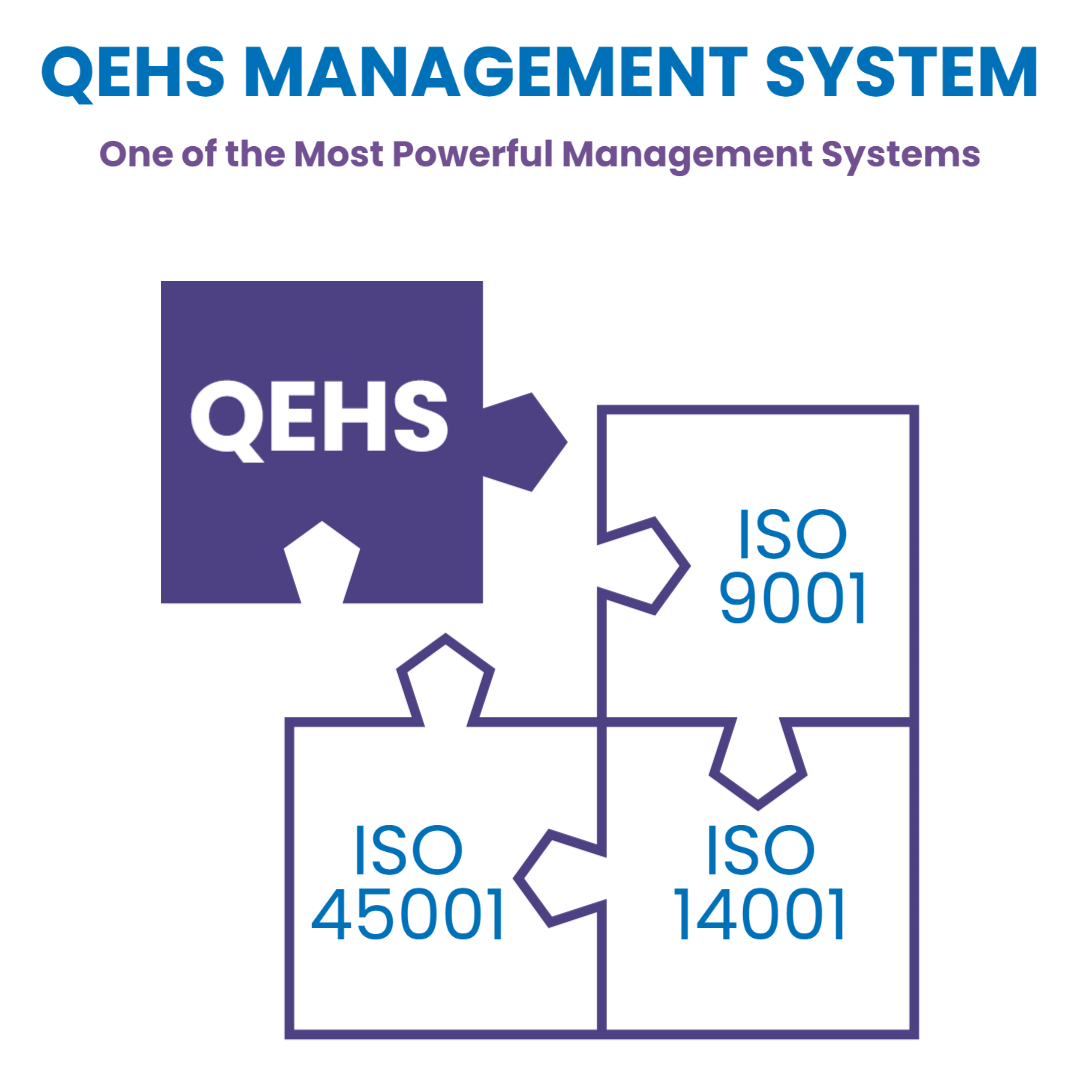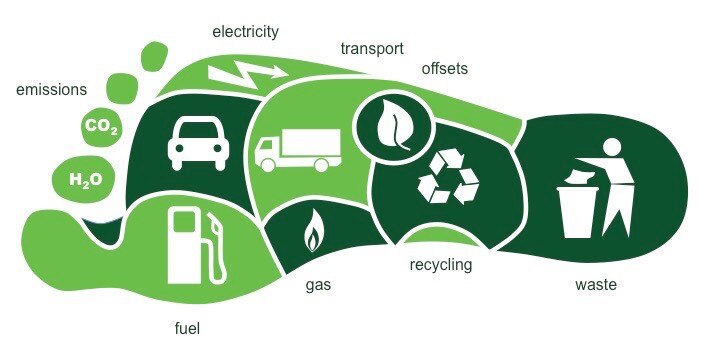Why QEHS Management System?
QEHS Management System is one of the most powerful management systems in implementing ISO standards across an organisation. What is QEHS?
8 min read
Caroline Geoghegan : Aug 22, 2023 9:29:55 AM

Cultivate a culture where excellence is not a goal but a way of life. In this article, we explore how QEHS management systems serve as the cornerstone of organisational culture, fostering a collective commitment to quality, sustainability, and employee welfare.

QEHS Management System stands for "Quality, Environment, Health, and Safety Management System." It is an integrated approach to managing an organisation's quality, environmental sustainability, and health & safety aspects. This system combines principles, processes, policies, and practices from different management disciplines. With a QEHS Management system, three ISO standards are integrated, which are.
By demonstrating a commitment to quality both within and without, increase retention rates and achieve greater buy-in from staff by giving employees a clear, streamlined process-based system with which to work, employers can avoid the risk of complication and confusion that can so often lead to disharmony and sub-par performance.
In today’s world, Businesses without an Environmental strategy and ambitious Sustainability targets have drastically dropped down the pecking order in terms of customer and employee loyalty. Optimising sustainable performance across disciplines such as waste, carbon footprint/emissions and plastic management doesn’t just send out the right signals, it is a pro-active move in a direction that will ultimately benefit today and in the future.
It goes without saying that a healthy workforce is a happy workforce, ensuring they have the physical and mental capacity to carry out their duties without stress or strain. By providing a clean, healthy and risk-free work environment will yield better performance results from a workforce that knows its welfare is paramount and that is respected by those in leadership positions.
View ISO
An harmonisation of Quality (ISO 9001), Environmental (ISO 14001) and (occupational) Health & Safety (ISO 45001) Management Systems. A one-stop ‘best practice’ shop that offers businesses the combined benefits of three leading ISO management system standards: ISO 9001, ISO 14001 and ISO 45001.
By their very nature, ISO Management Systems offer organisations a myriad benefits;
1.
Enhanced Customer Satisfaction: ISO 9001 focuses on meeting customer requirements and delivering consistent, high-quality products or services. By implementing this standard, you ensure that customer needs are met, leading to improved customer satisfaction and loyalty.
1.
Process Efficiency: ISO 9001 promotes efficient processes and continuous improvement. Through standardised processes and systematic monitoring, your business can identify and eliminate inefficiencies, reducing waste and costs.
3.
Risk Management: ISO 9001 emphasises risk-based thinking. By identifying and addressing potential risks to product quality and customer satisfaction, you can proactively manage risks and prevent issues.
2.
Increased Competitiveness: ISO certification is recognised globally and can give your business a competitive edge. Many customers and partners prefer to work with certified organisations as it signifies a commitment and reliability.
5.
Stakeholder Confidence & Engagement: ISO 9001, ISO 14001 & ISO 45001 certification instills confidence in stakeholders such as employees, customers, investors, and regulatory bodies. It demonstrates your dedication to delivering consistent quality, commitment to environmental sustainability and enhance your relationships within communities where your business operates. Certification will positively impact your reputation.
6.
Environmental Responsibility: By implementing sustainable practices, waste reduction strategies, and resource-efficient processes, you contribute to environmental conservation. prioritises employee safety. This can enhance your reputation and build trust.
7.
Regulatory & Legal Compliance: ISO 14001 ensures that your business stays compliant with environmental regulations. ISO 45001 ensures compliance with occupational health and safety regulations, this minimises the risk of legal issues, fines, and reputational damage associated with non-compliance, while also showing your commitment to employee welfare.
3.
Cost Savings: Environmental responsibility often leads to cost savings, energy efficiency measures, waste reduction, ISO 45001 will help staff turnover therefore saving costs on annual hiring and new staff training, with increased staff retention. Certification can leads to positive brand reputation, repeat business, and referrals.
9.
Innovation and Market Opportunities: By embracing eco-friendly practices and aligning with growing consumer & employee demand for sustainable products and services, ISO 14001 can open up new markets and business opportunities.
10.
Enhanced Customer Satisfaction: ISO 9001 focuses on meeting customer requirements and delivering consistent, high-quality products or services. By implementing this standard, you ensure that customer needs are met, leading to improved customer satisfaction and loyalty.
11.
Employee Safety and Wellbeing: ISO 45001 prioritises the health and safety of your employees. By identifying and mitigating workplace hazards, you create a safer work environment that reduces accidents, injuries, and absenteeism.
12.
Improved Employee Morale: Investing in employee health and safety demonstrates that your business values its workforce. This can boost employee morale, job satisfaction, and retention.

While the initial effort might be slightly more intensive, the long-term benefits in terms of efficiency, effectiveness, and organisational alignment can be significant. An experienced consultant with expertise in these standards can assist in the successful integration process.
Having an integrated management system that incorporates ISO 9001, ISO 14001, and ISO 45001 can provide several advantages over maintaining separate individual management systems. The integration of these standards allows for a cohesive and streamlined approach to managing quality, environmental sustainability, and occupational health and safety. It provides a robust platform and powerful incentive for senior management and their teams to effect those changes necessary to fulfil ambitious strategies and achieve agreed targets across all aspects of the business ranging from customer and employee satisfaction to carbon footprint and sustainability.
Some reasons to choose to have these systems integrated rather than stand alone.
1.
Efficiency and Synergy: Integrating the management systems eliminates duplications in processes and documentation. Resources, efforts, and time spent on managing individual systems can be optimized, leading to more efficient operations.
2.
Simplified Auditing and Compliance: Auditing processes become more streamlined and less time-consuming when all three standards are integrated. Auditors can assess multiple aspects simultaneously, reducing the disruption to your business and saving resources.
3.
Data Sharing and Reporting: An integrated system enables the sharing of relevant data and information across different departments and functions. This can lead to better decision-making, improved communication, and more accurate reporting.
4.
Cross-Functional Collaboration: Employees from different departments can work together more effectively in an integrated system. This collaboration can lead to innovative solutions, enhanced problem-solving, and a better understanding of how different aspects of the business interconnect. Communication becomes clearer when addressing quality, environmental, and safety matters in an integrated manner. This helps prevent misunderstandings and ensures that key information is shared effectively.
5.
Resource Optimisation: Combining efforts for maintaining a single integrated system is often more cost-effective than managing multiple individual systems. Resources that would have been spent on maintaining separate systems can be redirected to strategic initiatives.
A correctly integrated QEHS MS will not just enable an organisation to successfully perform its duties to a achieve agreed targets and objectives, it will support its ambitions of scale and expansion into new and/or emerging markets.
Implementing an integrated QEHS Management System is a relatively straightforward affair and obviously one that is much less taxing if a trusted ISO consulting house is retained to project manage the work.
For existing ISO MS clients, it is a matter of certifying to the additional Management System standard and scaling the current Management System to wrap around all three standards. For new clients, CGBC will take a consultative and collaborative approach to ensure that we get the very best results, tailoring the QEHS MS to meet the demands, needs, objectives and strategies of the organisation.
Our website can provide you with an introduction to integrated MS while our consultants will be only too happy to have a no strings chat with you, to talk you through the steps to achieving a best-fit QEHS MS for your business.
To talk to one of our team today, contact CG Business Consulting on 01 620 4121 or drop us a line on hello@cgbc.ie.
The time required to implement a QEHS Management System in an organisation can vary widely based on several factors. These factors include size, complexity, industry, existing management systems, resources allocated, and the degree of integration needed. Generally, the implementation timeline can range from three months or more (please note: CGBC undertakes the majority of the day-to-day heavy lifting such as creating and implementing of the system – We just require your internal team to be available for adhoc days over the implementation months for interviews & training from time to time, which will be agreed prior to the project).
As you embark on the journey of integrating a QEHS Management System, remember that you're not just aligning processes; you're sculpting a culture of excellence.
Like an artist shaping a masterpiece, you're chiseling away inefficiencies, adding layers of sustainability, and polishing the gem of employee well-being. This integration isn't just a merger of systems; it's a fusion of values that will ripple through every action, every decision, and every smile within your organisation.
So, embrace this crafting process – carve out a path where excellence isn't a goal, but a way of life. Let your integrated QEHS Management System be the brush that paints a canvas of success, where every stroke resonates with quality, environment, and health & safety.
The masterpiece you're creating isn't just for today; it's for a future where excellence is the legacy.
What is QEHS?
Based on the triumvirate (trio) themes of Quality, Environmental, and Health & Safety, a QEHS management system effectively combines those elements and principles that constitute the most widely adopted of ISO standards:
This three-in-one management system publicly signals an organisations commitment not just to the quality of its products and services but also to its impact on the environment, both locally and globally. It is also a statement of intent in terms of managerial and organisational concern for the continued health and safety of its personnel.
Why do you need QEHS?
There are several reasons an organisation might decide to implement a QEHS management system.
The benefits far outweigh the remote possibility of any negatives. Time and again, ISO management systems have proved beneficial to all businesses regardless of size or type.
What are the benefits of QEHS?
The following benefits are worth considering when making the strategic decision whether to implement a QEHS management system:
QEHS management systems have proved especially effective within and beneficial to industries reliant on physical labour and/or where safety protocols are paramount, including construction, engineering, Pharma, energy, and manufacturing.
The benefits of hiring a CGBC QEHS Consultant to advise your organisation
Given that the QEHS Management System is essentially an amalgam of three separate ISO standards - ISO 9001, ISO 14001 & ISO 45001 - its implementation is not for the faint-hearted.
Fundamental to the successful implementation, management, and continuous improvement of an integrated QEHS MS is complete knowledge and understanding of the intricacies of the relevant ISO standards and their many regulations.
This is especially pertinent for small to medium-sized organisations with limited resources and/or resource availability and has become all the more important in the current climate of hybrid working.
Hiring an experienced QEHS consultant can remove the burden of having to invest time and energy of senior personnel, thereby freeing them up to focus on the more important day-to-day management of your business.
Some of the key benefits to your organisation of hiring a respected QEHS consultant would include:
How can CG Business Consulting help your organisation?
As Ireland’s leading ISO consulting firm, CG Business Consulting can help your organisation through effective QEHS management system consulting services delivered by our team of experienced ISO consultants.

QEHS Management System is one of the most powerful management systems in implementing ISO standards across an organisation. What is QEHS?

Bizquip Commercial Interiors appproached CG Business Consulting off the back of a recommendation from a previous client, wanting assistance on...

Experts are now saying that recycling isn't having the expected impact. Here are twelve alternatives to help you curb your carbon imprint. Less than...